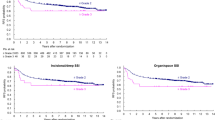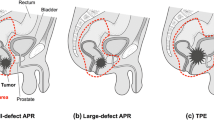Abstract
Background
High morbidity, increased mortality, and impaired long-term oncologic outcome have been reported after deep surgical site infection (SSI) in rectal cancer surgery. The rate, risk factors and consequences of deep SSI after (chemo)radiotherapy [(C)RT], and surgery for locally advanced rectal cancer (LARC) in a tertiary university hospital single centre cohort of 540 patients are presented.
Methods
Patients with LARC, operated between January 1, 2007 and December 31, 2015, were identified in the institutional prospective database. All patients had tumours threatening the mesorectal fascia or invading adjacent organs, with a high rate of T4 tumours (60 %), and all received (C)RT. Risk factors for deep SSI were calculated by multivariable logistic regression analysis. Morbidity data were assessed. Overall survival (OS) and disease-free survival (DFS) between patients with or without deep SSI were estimated.
Results
Of 540 patients, 104 (19 %) experienced a deep SSI, with the highest rate in the abdominoperineal resection (APR) group with 25 %. APR, good response to (C)RT (low tumour regression grade), age, and operative blood loss were identified as significant (P < 0.05) risk factors for deep SSI in multivariable analysis. No difference was found in OS (P = 0.995) or DFS (P = 0.568). Hospital stay increased with 5 days (P < 0.001), and complete wound healing at the 3-month follow-up decreased from 86 to 45 % (P < 0.001) after deep SSI.
Conclusions
Deep SSI is a frequent and major complication after rectal surgery for LARC, with high morbidity, increased hospital stay and protracted wound healing. Interestingly, deep SSI did not influence long-term oncologic outcome.

Similar content being viewed by others
References
Berardi R, Maccaroni E, Onofri A, et al. Locally advanced rectal cancer: the importance of a multidisciplinary approach. World J Gastroenterol. 2014;20(46):17279–87.
Sauer R, Becker H, Hohenberger W, et al. Preoperative versus postoperative chemoradiotherapy for rectal cancer. N Engl J Med. 2004;351(17):1731–40.
Sauer R, Liersch T, Merkel S, et al. Preoperative versus postoperative chemoradiotherapy for locally advanced rectal cancer: results of the German CAO/ARO/AIO-94 randomized phase III trial after a median follow-up of 11 years. J Clin Oncol. 2012;30(16):1926–33.
Schiffmann L, Wedermann N, Gock M, et al. Intensified neoadjuvant radiochemotherapy for rectal cancer enhances surgical complications. BMC Surg. 2013;13:43.
de Lussanet QG, Backes WH, Griffioen AW, et al. Dynamic contrast-enhanced magnetic resonance imaging of radiation therapy-induced microcirculation changes in rectal cancer. Int J Radiat Oncol Biol Phys. 2005;63(5):1309–15.
Krol R, Hopman WP, Smeenk RJ, Van Lin EN. Increased rectal wall stiffness after prostate radiotherapy: relation with fecal urgency. Neurogastroenterol Motil. 2012;24(4):339-e166.
Sammour T, Kahokehr A, Soop M, Hill AG. Peritoneal damage: the inflammatory response and clinical implications of the neuro-immuno-humoral axis. World J Surg. 2010;34(4):704–20.
Hawkins AT, Berger DL, Shellito PC, Sylla P, Bordeianou L. Wound dehiscence after abdominoperineal resection for low rectal cancer is associated with decreased survival. Dis Colon Rectum. 2014;57(2):143–50.
Bouzourene H, Bosman FT, Seelentag W, Matter M, Coucke P. Importance of tumor regression assessment in predicting the outcome in patients with locally advanced rectal carcinoma who are treated with preoperative radiotherapy. Cancer. 2002;94(4):1121–30.
Bullard KM, Trudel JL, Baxter NN, Rothenberger DA. Primary perineal wound closure after preoperative radiotherapy and abdominoperineal resection has a high incidence of wound failure. Dis Colon Rectum. 2005;48(3):438–43.
Artioukh DY, Smith RA, Gokul K. Risk factors for impaired healing of the perineal wound after abdominoperineal resection of rectum for carcinoma. Colorectal Dis. 2007;9(4):362–7.
Musters GD, Sloothaak DA, Roodbeen S, van Geloven AA, Bemelman WA, Tanis PJ. Perineal wound healing after abdominoperineal resection for rectal cancer: a two-centre experience in the era of intensified oncological treatment. Int J Colorectal Dis. 2014; 29(9):1151–7.
van der Vaart MG, van der Zwet WC, Arends JW, Eeftinck Schattenkerk M, Eddes EH. Rectal carcinoma treated with short-term preoperative radiotherapy followed by abdominoperineal resection. Significantly more presacral abscesses with absence of local recurrence. Dig Surg. 2006;23(3):173–7 (Discussion 177–8).
Sato T, Ozawa H, Hatate K, et al. A Phase II trial of neoadjuvant preoperative chemoradiotherapy with S-1 plus irinotecan and radiation in patients with locally advanced rectal cancer: clinical feasibility and response rate. Int J Radiat Oncol Biol Phys. 2011;79(3):677–83.
Vermeer TA, Orsini RG, Daams F, Nieuwenhuijzen GA, Rutten HJ. Anastomotic leakage and presacral abscess formation after locally advanced rectal cancer surgery: incidence, risk factors and treatment. Eur J Surg Oncol. 2014;40(11):1502–9.
Kamrava A, Mahmoud NN. Prevention and management of nonhealing perineal wounds. Clin Colon Rectal Surg. 2013;26(2):106–11.
Pang J, Broyles JM, Berli J, et al. Abdominal- versus thigh-based reconstruction of perineal defects in patients with cancer. Dis Colon Rectum. 2014;57(6):725–32.
Baur M, Horvath M, Stattner S, et al. Chemoradiotherapy with 5-fluorouracil/leucovorin, surgery and adjuvant chemotherapy for locally advanced rectal cancer. Oncol Lett. 2010;1(1):189–94.
Waelgaard L, Pharo A, Tonnessen TI, Mollnes TE. Microdialysis for monitoring inflammation: efficient recovery of cytokines and anaphylotoxins provided optimal catheter pore size and fluid velocity conditions. Scand J Immunol. 2006;64(3):345–52.
Matthiessen P, Strand I, Jansson K, et al. Is early detection of anastomotic leakage possible by intraperitoneal microdialysis and intraperitoneal cytokines after anterior resection of the rectum for cancer? Dis Colon Retcum. 2007;50(11):1918–27.
Telem DA, Chin EH, Nguyen SQ, Divino CM. Risk factors for anastomotic leak following colorectal surgery: a case-control study. Arch Surg. 2010;145(4):371–6 (Discussion 376).
Pommergaard HC, Gessler B, Burcharth J, Angenete E, Haglind E, Rosenberg J. Preoperative risk factors for anastomotic leakage after resection for colorectal cancer: a systematic review and meta-analysis. Colorectal Dis. 2014;16(9):662–71.
Althumairi AA, Canner JK, Gearhart SL, Safar B, Sacks J, Efron JE. Predictors of perineal wound complications and prolonged time to perineal wound healing after abdominoperineal resection. World J Surg. 2016;40(7):1755–62.
Althumairi AA, Canner JK, Gearhart SL, et al. Risk factors for wound complications after abdominoperinal resection: analysis of the ACS NSQIP database. Colorectal Dis. 2016;18(7):O260-6.
Mirnezami A, Mirnezami R, Chandrakumaran K, Sasapu K, Sagar P, Finan P. Increased local recurrence and reduced survival from colorectal cancer following anastomotic leak: systematic review and meta-analysis. Ann Surg. 2011;253(5):890–9.
Ptok H, Marusch F, Meyer F, et al. Impact of anastomotic leakage on oncological outcome after rectal cancer resection. Br J Surg. 2007;94(12):1548–54.
den Dulk M, Marijnen CA, Collette L, et al. Multicentre analysis of oncological and survival outcomes following anastomotic leakage after rectal cancer surgery. Br J Surg. 2009;96(9):1066–75.
Eriksen MT, Wibe A, Norstein J, Haffner J, Wiig JN, Norwegian Rectal Cancer G. Anastomotic leakage following routine mesorectal excision for rectal cancer in a national cohort of patients. Colorectal Dis. 2005;7(1):51–7.
Acknowledgment
The authors thank the staff at the Department of Surgery at the Norwegian Radium Hospital Oslo University Hospital for their daily efforts and dedication for the patients. A special thanks goes to Veronica M. Alexandersen for her invaluable help with sorting and plotting of patient data.
Disclosure
The authors declare no conflict of interest.
Author information
Authors and Affiliations
Corresponding author
Additional information
S. G. Larsen and K. Flatmark have contributed equally to the study.
Electronic supplementary material
Below is the link to the electronic supplementary material.
Rights and permissions
About this article
Cite this article
Thorgersen, E.B., Goscinski, M.A., Spasojevic, M. et al. Deep Pelvic Surgical Site Infection After Radiotherapy and Surgery for Locally Advanced Rectal Cancer. Ann Surg Oncol 24, 721–728 (2017). https://doi.org/10.1245/s10434-016-5621-5
Received:
Published:
Issue Date:
DOI: https://doi.org/10.1245/s10434-016-5621-5




